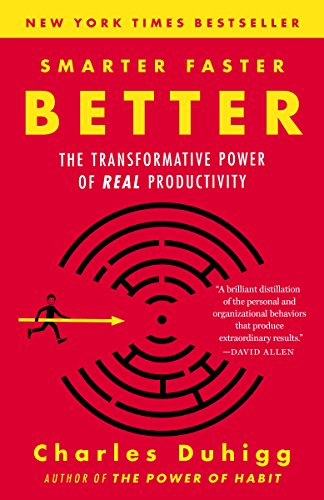Have you ever met someone who always gets things done? Their work is always on time, if not early. Hand them an hour-long task, and they’ll wrap it up in 30 minutes or less?
They’re not robots or machines. They’re regular people who know how to take advantage of their environment in order to work more efficiently.

Smarter Faster Better
by Charles Duhigg
⏱ 15 minutes reading time
🎧 Audio version available
Challenges to Overcome
The first step into becoming a super efficient person is to locate the most difficult challenges that hinder your productivity and figure out how to overcome them. Common challenges include, first and foremost, staying energized throughout the work day. It’s hard to stay motivated, even if you start your day off correctly.
Sometimes, the work can be so boring that you have to muster up the strength to get it done. You could have multiple important projects that need to be finished and not enough time. The answer to knocking these tedious tasks off your schedule is right ahead.
Not to mention, the biggest enemy to efficiency: procrastination.
Ah, procrastination. It feels good in the moment, but you regret it afterwards. And it’s a nemesis to productivity and efficiency.
Today, we’re also going to teach you that working hard doesn’t necessarily mean working longer. The phrase “work smarter, not harder” has never rung truer. These tips will guarantee the best results without wasting your time and energy.
Remove Distractions
Distractions won’t just temporarily slow you down– they affect your mental flow, making it harder to get back into the productive rhythm.
What is considered as a distraction? Your phone, for one thing. You cannot expect to crunch numbers at lightning speed, for your fingers to be a blur on the keyboard as you type, if you’re distracted by things that aren’t helping you in the work you have.
Having your phone on hand allows temptations to creep in. You may check your text messages, your email, see a notification on social media, et cetera.
Another distraction is constantly getting up to get something. As you can expect, constantly getting to grab your charger, a pen, pencil, paper, or whatever you need is going to waste so much of your day. Not to mention, getting up repeatedly also messes with your productive rhythm.
So, make sure your space is clear of all distractions and that you have everything you need.
Determine Your Priorities
The first step is to figure out your priorities. Rank your upcoming tasks based on the amount of work involved and, most importantly, how close the deadline is. Select the task with the most urgency and set a timer.
Now, you’re going to allow yourself to get lost in this task, to be absorbed in it, and then when that timer goes off, either take a break or move on to the next task. This way, you’re always going to be engaged in your current task without stressing about something else. More tips about how to manage your time is coming up in minutes! You won’t want to miss this advice.
Schedule Busywork
What is “busy work?” It’s all the easy, simple tasks that are easy to check off your to-do list but are also incredibly time consuming. After a few hours of doing busy work, you’ll find yourself feeling distracted and most importantly, feeling unproductive.
Busy work is unfortunately necessary. The solution is to schedule a limited period of time each day, a slot of your schedule to check off any necessary busy work. Your best hours, the times when you’re most productive, this when your most important tasks should take precedence. Save the busy work for later, after your most productive times have been put to better use.
Break Productively
A trick to working faster and smarter isn’t to work for hours on end, even if you’re on a roll. It’s taking short breaks. These breaks help you stay ultra-focused and rested so that when you continue working, your results are going to both faster and of better quality.
Chances are, even if you don’t schedule them, you’re going to take a break anyway. At least now you have control of when and how long these breaks are. You’re also keeping yourself from continuing your workday without breaks, which can result in lower quality work and more stress.
Set Deadlines for Yourself
Love them or hate them, deadlines and timers are a life-saver when it comes to efficiency. Without them, there will be no invisible force pushing you to finish on time and in the most efficient way possible.
There’s something called Parkinson’s law, which says, “work expands to fill the time allotted.”
That means that the amount of time you spend on a task depends on the amount of time you set to complete this task. Without a deadline, you’ll likely take much longer to finish the task at hand. By enforcing a deadline, the pressure will force you to work faster.
Use this trick a few times and you’ll notice something unusual. When you time your task, you’ll find a mental state of flow descends upon you.
This mental state of flow is basically being on a roll. You’re in the zone. You’re so laser-focused, so immersed in your task, that you naturally only focus on the said task.
Break Your Tasks Into Smaller Chunks
There is so much to do, a plethora of projects to finish, seas of emails to answer, and a zillion tasks ahead. It seems so daunting. But there is a way to overcome this– a shortcut to the finish line.
It’s tough to work for hours and days on end without feeling a reward coming. With this method, you have the added benefit of feeling a sense of accomplishment with every task you check off. In fact, you get that blood-tingling sense of accomplishment several times a day, resulting in feeling more energized and motivated to work harder and more efficiently.
Want scientific proof of this? Harvard Business Review took it upon themselves to study it, and they found, according to over 12,000 diary entries of workers, that a sense of progress is the most important part of improving motivation, emotions, and perceptions during the day– no matter how small or big that sense of progress is. The more frequently they sensed progress, the more productive they were.
Use the Pomodoro Technique
What is the Pomodoro technique? It’s the closest thing we have to a magic potion to work more efficiently.
The Pomodoro technique takes advantage of the fact that humans work best in 120 minute biological intervals throughout the day. These intervals are called “ultradian rhythms” . Now, during the first 90 minutes of each interval, your productivity reaches its peak. After that, your mental energy starts lagging, dropping for around 30 minutes.
The Pomodoro technique maximizes both speed and productivity. Work for 25 minutes sprints. Your body is at its peak, energy-wise, and then you take 5 minute breaks during the times when your body and mind are naturally exhausted. Because you’re working when you’re naturally focused and taking a break when you’re naturally tired, losing focus becomes a thing of the past!
Listen to White Noise
Our last tip is a favourite of ours! There’s a trick when it comes to listening to music and working at the same time– a trick that results in faster and better results.
Listening to music with lyrics makes your brain struggle between paying attention to the lyrics and the task at hand– and trust us, most of the time, your brain will choose the music.
Obviously, the type of music matters. Contrary to popular belief, classical music is not the answer.
For one thing, listening to unfamiliar music is not beneficial for productivity. Brains like novelty, and new music offers the perfect amount of dopamine. So, yes, classical music doesn’t have lyrics, but if you have never listened to these songs, they’ll affect your concentration.
That probably leaves most of your favorite songs out of the question, so what should you do? Two words: white noise.
Throw on a pair of noise-canceling headphones, crank up some white noise, and you’ll find that your performance is enhanced beyond belief. The magical thing about white noise, and why it’s so dramatically effective when it comes to enhancing focus, is because it’s constant.
White noise sounds the same, and your brain picks up on that. As you get used to it, auditory distractions stop affecting you, effectively allowing you to work faster.
What Is Snapreads?

With the Snapreads app, you get the key insights from the best nonfiction books in minutes, not hours or days. Our experts transform these books into quick, memorable, easy-to-understand insights you can read when you have the time or listen to them on the go.


